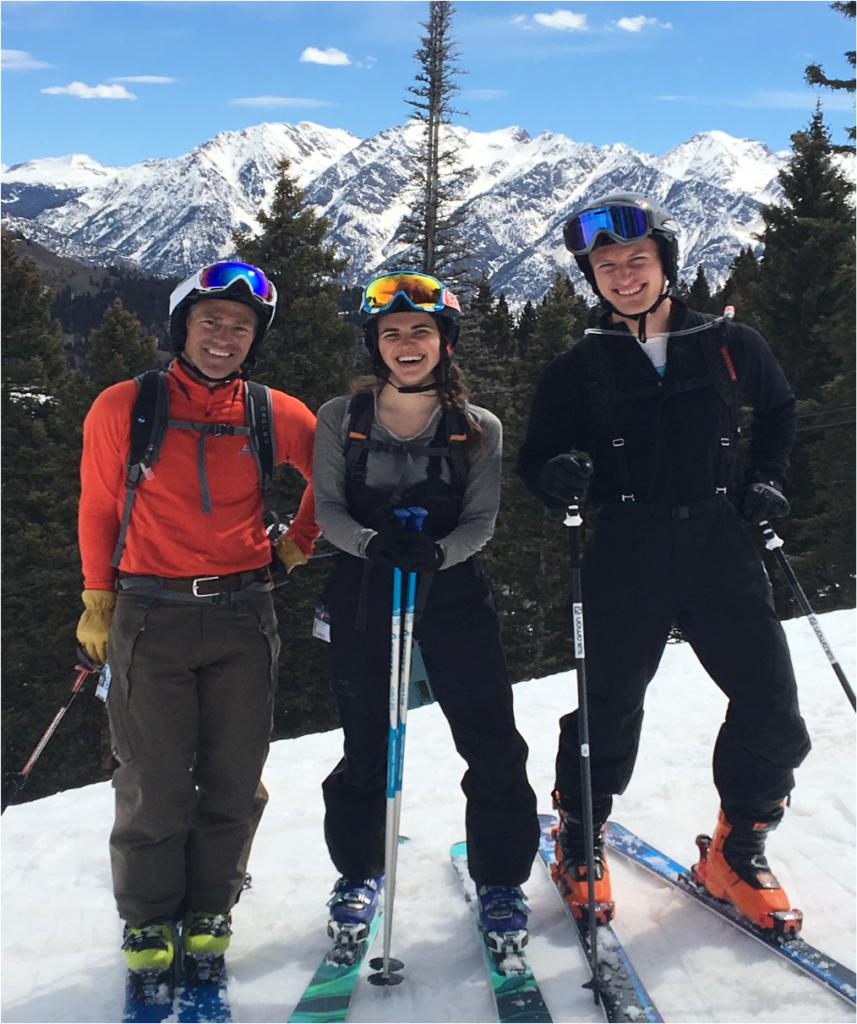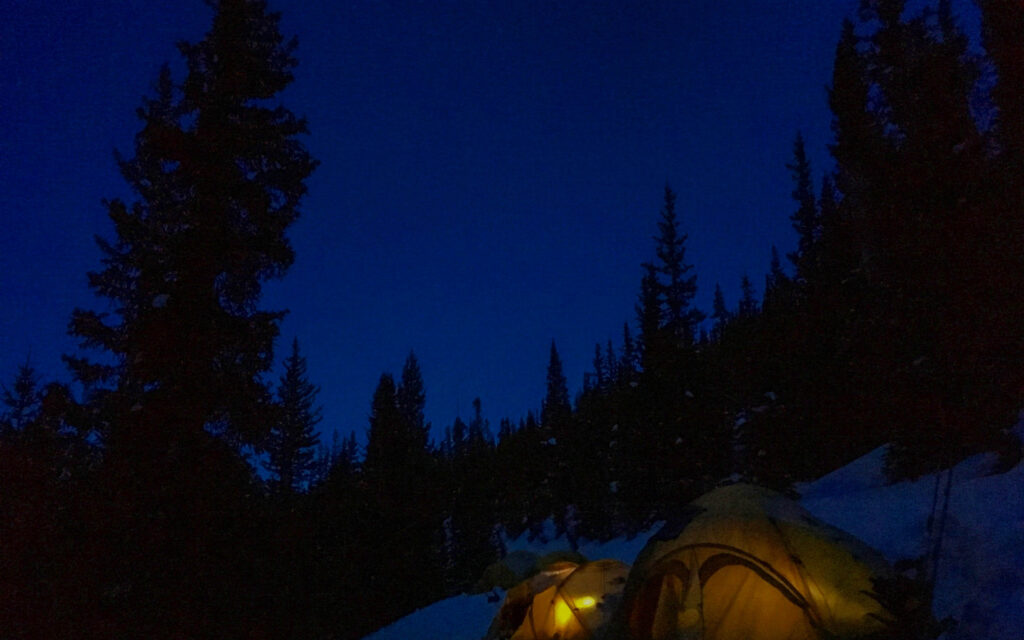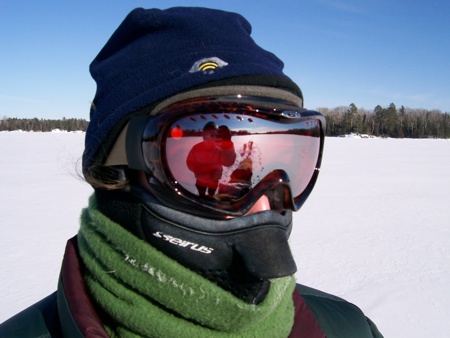The mountain base of the Hurricane Island Outward Bound School is nestled in the Mahoosuc Mountains in Newry, Maine. A place where the summers bring long, sweaty days. In years past, Instructors enjoyed making evening excursions to get ice cream cones in the nearest town, then visit the sled dog teams belonging to staff who live nearby. On an August evening, the huskies would bound wildly inside their fenced area upon seeing visitors, eager to get outside and dreaming of running through fresh snow. That eagerness is how many of us feel now, deep into the pandemic and at the edge of winter.
Jeremy Read worked for Outward Bound and grew up in rural Maine, not far from the L.L. Bean mountain base. At Outward Bound, he was a Logistics Coordinator at basecamp where he supported crews in the field in myriad ways. He is now a cartographer and farmer, as well as a ski coach and an ebullient lover of winter.
As a leader in winter sports and winter adventures, Jeremy has thought hard about the challenges of the pandemic and its invitation for us to change our mindset around engaging with the winter world. We circled-up three tips to change our perspective about this winter and to help all of us responsibly approach winter adventures.

Jeremy Read is pictured far right enjoying one of his favorite outdoor activities.
1. What Types of Opportunities Are Unique to This Time of Year?
Jeremy: “Often people think of winter as a blighted version of the world rather than a unique world unto itself. Some of the best adventures I’ve had involved taking the frozen landscape for what it is and asking, what opportunities present themselves that are unique to this time of year? One of the most important ways of enjoying winter for me is leaning into its differences and noticing that the world is completely different from the other six months of the year. If I lean into what it is without wanting it to be warmer or sunnier or grassier, it’s incredibly beautiful and there are so many new parts of the world that are open that are not part of the summer woods.
If you’re someone who enjoys taking walks in nature, winter can be a good time to explore in new ways. A landscape that you might have walked through a hundred times before looks completely different. Even if there’s no snow, the undergrowth has died back so it’s easier to navigate and to move. The ground is frozen, so in many places, you don’t have to worry about ticks as much. You could find features that you never knew about— streams, waterfalls, outcroppings.”
2. How Can Winter Allow Us to Experience What Is Close to Home in New Ways?
This year, when all of our living takes place closer to home, that includes our winter adventures too. Still, attuning to the changes of the winter world can allow us to see our localities in new ways.
Jeremy: “Growing up, my primary outdoor activities were shoveling and snowball fights, then skiing. Any time there was a big snowstorm, I was out in it all day long— three different pairs of jeans over the course of the day because each one got soaked.”
During the long winter nights when there is so much darkness, Jeremy described the thrill of stepping outside on a snowy night and using a flashlight to play with light and reflection or explore the pitch black with a night-time walk or snowshoe. Even if there’s no snow, we chatted about ways of becoming more familiar with the uncovered winter world.
Try it for yourself. Create an outdoor treasure hunt near your home or make a small collection of winter wonders. Consider what happens when the ground freezes and dig a soil profile as a way to explore. Try tracking the traces of critters in the snow or notice the patterns of creatures in the exposed landscape.
Jeremy: In the winter months, “One thing I’ve been noticing is the amount of micro-trash on the ground. When the grass dies back, you can see so much plastic. There are these jogging groups in Scandinavia that go trash-jogging, collecting whatever they find between Point A and Point B. Can you take this opportunity to find other ways to steward the environment in winter?” These activities serve the principles of Leave No Trace practiced on Outward Bound courses.

Photo by Hannah Trim.
3. What New Risks in Winter Adventures Present Themselves This Year?
Jeremy: “With leadership in the outdoors in general, the principle is always safety first. This year, that feels like a magnified responsibility and also a constant challenge to be more creative and more imaginative in terms of the potential risk vectors that present themselves.”
Oftentimes, winter outdoor enthusiasts can easily identify hypothermia, frostbite and bone fractures as common risks in outdoor recreation activities. Nonetheless, this year the pandemic requires integrating novel factors into winter risk management.
Jeremy: “A lot of our risk awareness really comes from repeated exposure to the reality of those risks. Given that this is something that is so hard to grasp for many people, a challenging dynamic can occur.”
Honing in on the Individual Experience
This year, many forms of group recreation are canceled, and getting outside during the winter will, in many cases, be a much more individual experience. Though the social component of outdoor adventures is important for many people, at the same time, Jeremy was quick to ask how we can change our mindsets and learn from this winter.
Jeremy: “A scenario where we have to take some of the social out of winter sports actually presents a lot of really positive challenges for athletes. Social interaction is a huge component of youth recreation and one of the primary benefits. But, from an athletic development perspective, it can prime the focus more on your own experience of the sport and less on your competition with other people. In team sports, you’re often isolated from the reality that it is about your ability to show up each day a little better than the day before.”

Photo by Terri Latimer.
And showing up for adventure in winter can look so many different ways this year. “As an only child who grew up spending entire snowy days by myself, I can say that it is entirely possible to spend hours that go by in the blink of an eye building snow forts and digging tunnels, and just generally moving snow in satisfying ways!”
As we do on Outward Bound courses, this year is challenging each of us to re-think our relationships with the outdoor world. This change of season presents a unique moment to embrace a transformed landscape, a new sense of locality and attention to the opportunities of different ways of exploring the outdoors.
About the Author
Nora Spicer has instructed backpacking and canoeing courses at the Hurricane Island Outward Bound School for five years. She has an MA in Environmental History from Harvard University and aims to bridge wilderness living and academic study through outdoor education. She is currently developing a curriculum for an expedition-based semester program traversing US-Mexico borders by human-powered travel and is traveling for research on Borderlands education.
OTHER POSTS YOU MAY LIKE
Read More
Read More
Read More




